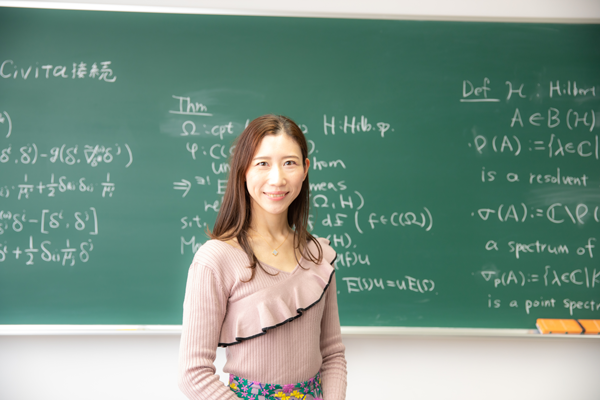DATE2023.03.27 #FEATURES#The Rigakubu News
Meet Researchers in the Sciences Vol.6 Chihiro Matsui

I want to understand how the world works through math!

![]() Chihiro MatsuiAssociate Professor, Graduate School of Mathematical Sciences
Chihiro MatsuiAssociate Professor, Graduate School of Mathematical Sciences
She received her B.S. in Physics from the Faculty of Science at the University of Tokyo in 2007, her M.S. in Physics from the Graduate School of Science at the University of Tokyo in 2009, and her Ph.D. in Physics from the University of Tokyo in 2012. She was a JSPS Research Fellow in 2011. In 2012, she joined the JST FIRST Aihara Advanced Mathematical Modeling Project as a researcher. In 2013, she became an assistant professor at the Mathematical Informatics 4th Laboratory, Department of Mathematical Informatics, Graduate School of Information Science and Technology at the University of Tokyo. In 2016, she became an assistant professor at the Mathematical Informatics 3rd Laboratory, Department of Mathematical Informatics, Graduate School of Information Science and Technology at the University of Tokyo. In 2017, she joined the Graduate School of Mathematical Sciences at the University of Tokyo as an associate professor.
Q. What were your favorite subjects as a child?
A. Science and Music
Besides science, I loved music and took piano lessons as a child. I was especially interested in the scales used in folk music. At one time, I even considered entering a university where I could study musicology.
Q. What is your favorite quote or saying?
A. "Nothing in life is unimportant."
We were given a handout titled "The Most Important Thing I've Learned in Life" in English class back in high school with this quote from the composer John Cage. These words always push me forward when things don't go well or when I'm not sure if I should take a step forward.
Q. What do you like about the School of Science at the University of Tokyo?
A. Its broadness (laughs).
The Faculty of Science, with its 10 departments, is a huge organization, but it welcomes weird and unusual ideas. Students and faculty can freely pursue their research according to their interests.
Q. What are your hobbies?
A. Argentine tango
I started Argentine tango because I was invited to a research group banquet, but I had no idea how to dance with a partner. Later, I was surprised to find that there were many tango enthusiasts in the scientific community around the world.
Q. Do you consider yourself lucky?
A. Of course!
I found science and mathematics interesting and grew up in an environment that supported that feeling. I could find a job where I could pursue my passion and met wonderful people in the process. I am lucky in many ways.
Q. What are your sources of inspiration?
A. Museums and concerts
At first glance, art and science may seem unrelated. However, the passion for creating art and the trial-and-error approach to new ideas are things I can relate to. Interestingly, I feel motivated after experiencing art.
ー Message ー
The Rigakubu News, September, 2023
Meet Researchers in the Sciences
― This article is from the "Meet Researchers in the Sciences" series in The Rigakubu News ―
Translated by Office of Research Strategy and Development


